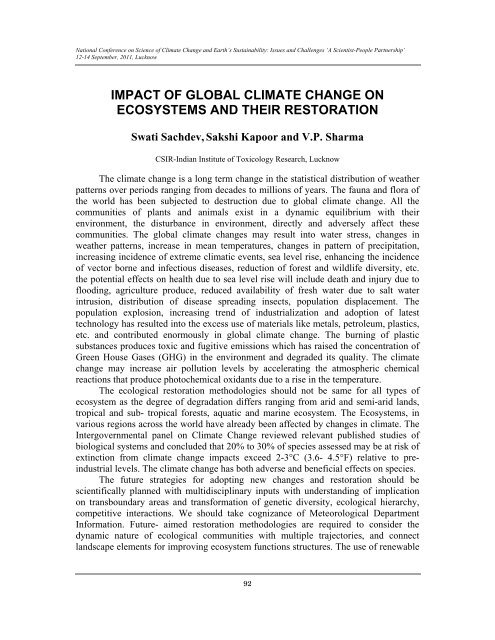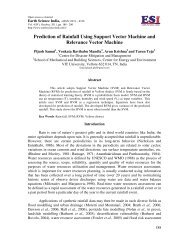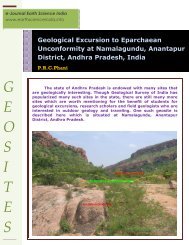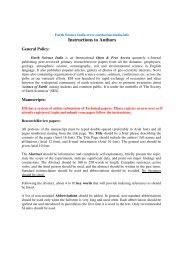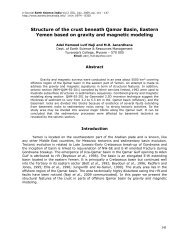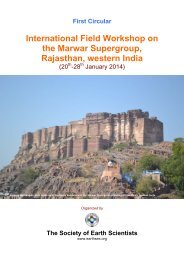12-14 September, 2011, Lucknow - Earth Science India
12-14 September, 2011, Lucknow - Earth Science India
12-14 September, 2011, Lucknow - Earth Science India
You also want an ePaper? Increase the reach of your titles
YUMPU automatically turns print PDFs into web optimized ePapers that Google loves.
National Conference on <strong>Science</strong> of Climate Change and <strong>Earth</strong>’s Sustainability: Issues and Challenges ‘A Scientist-People Partnership’<br />
<strong>12</strong>-<strong>14</strong> <strong>September</strong>, <strong>2011</strong>, <strong>Lucknow</strong><br />
IMPACT OF GLOBAL CLIMATE CHANGE ON<br />
ECOSYSTEMS AND THEIR RESTORATION<br />
Swati Sachdev, Sakshi Kapoor and V.P. Sharma<br />
CSIR-<strong>India</strong>n Institute of Toxicology Research, <strong>Lucknow</strong><br />
The climate change is a long term change in the statistical distribution of weather<br />
patterns over periods ranging from decades to millions of years. The fauna and flora of<br />
the world has been subjected to destruction due to global climate change. All the<br />
communities of plants and animals exist in a dynamic equilibrium with their<br />
environment, the disturbance in environment, directly and adversely affect these<br />
communities. The global climate changes may result into water stress, changes in<br />
weather patterns, increase in mean temperatures, changes in pattern of precipitation,<br />
increasing incidence of extreme climatic events, sea level rise, enhancing the incidence<br />
of vector borne and infectious diseases, reduction of forest and wildlife diversity, etc.<br />
the potential effects on health due to sea level rise will include death and injury due to<br />
flooding, agriculture produce, reduced availability of fresh water due to salt water<br />
intrusion, distribution of disease spreading insects, population displacement. The<br />
population explosion, increasing trend of industrialization and adoption of latest<br />
technology has resulted into the excess use of materials like metals, petroleum, plastics,<br />
etc. and contributed enormously in global climate change. The burning of plastic<br />
substances produces toxic and fugitive emissions which has raised the concentration of<br />
Green House Gases (GHG) in the environment and degraded its quality. The climate<br />
change may increase air pollution levels by accelerating the atmospheric chemical<br />
reactions that produce photochemical oxidants due to a rise in the temperature.<br />
The ecological restoration methodologies should not be same for all types of<br />
ecosystem as the degree of degradation differs ranging from arid and semi-arid lands,<br />
tropical and sub- tropical forests, aquatic and marine ecosystem. The Ecosystems, in<br />
various regions across the world have already been affected by changes in climate. The<br />
Intergovernmental panel on Climate Change reviewed relevant published studies of<br />
biological systems and concluded that 20% to 30% of species assessed may be at risk of<br />
extinction from climate change impacts exceed 2-3°C (3.6- 4.5°F) relative to preindustrial<br />
levels. The climate change has both adverse and beneficial effects on species.<br />
The future strategies for adopting new changes and restoration should be<br />
scientifically planned with multidisciplinary inputs with understanding of implication<br />
on transboundary areas and transformation of genetic diversity, ecological hierarchy,<br />
competitive interactions. We should take cognizance of Meteorological Department<br />
Information. Future- aimed restoration methodologies are required to consider the<br />
dynamic nature of ecological communities with multiple trajectories, and connect<br />
landscape elements for improving ecosystem functions structures. The use of renewable<br />
92


